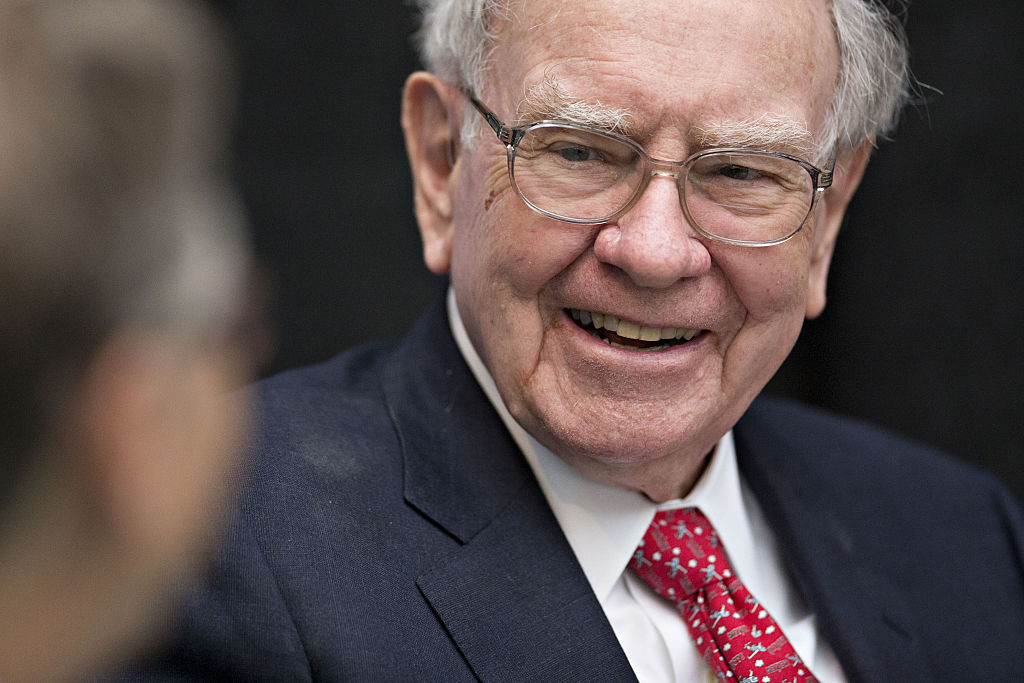Benefit from the Buffetts next door
The fintech revolution has made it easy to copy how others like you are investing. But it's not always a good idea, says David C Stevenson.

Get the latest financial news, insights and expert analysis from our award-winning MoneyWeek team, to help you understand what really matters when it comes to your finances.
You are now subscribed
Your newsletter sign-up was successful
Want to add more newsletters?

Twice daily
MoneyWeek
Get the latest financial news, insights and expert analysis from our award-winning MoneyWeek team, to help you understand what really matters when it comes to your finances.

Four times a week
Look After My Bills
Sign up to our free money-saving newsletter, filled with the latest news and expert advice to help you find the best tips and deals for managing your bills. Start saving today!

The financial technology (fintech) revolution is partly about as the name suggests better technology, which leads to lower costs and better accessibility. But it's also about the power of the crowd and one of the best examples of "crowd power" is in social investing and trading. Companies such as Israel-based eToro and US firm Covestor allow you to monitor what other users are doing, then copy their decisions. Their message is simple why trust the overpaid fund management "experts" instead of ordinary folk with extraordinary gifts?
It's a beguiling idea but as you can imagine, there are a few challenges. First, many of these putative "Warren Buffetts next door" tend to be of a particular type: day traders. There's nothing wrong with that per se, but it's far too risky for most of us, as a dip into the trading records reveals. Take one small example from eToro. One of its star investors is someone with the handle Yarostarak. He's recorded gains of 172% in the last 12 months, and 56% in May alone. Yikes. But look at his portfolio and you'll see cryptocurrency ethereum at the top of the list (worth 38% of his portfolio), followed by bitcoin at 18%.
To be fair, he trades in equities too: there's some Amazon and Twitter in there. But one of his recent blogs identifies a trade in a stock with ten times leverage (ie, lots of borrowed money). No wonder his weekly maximum drawdown (ie, the amount he loses in a given week) can be as much as 7%. That makes for a scary ride for most of us. Still, it's clear he's a smart cookie if rather active and he has more than 10,000 people following his trades on eToro.
MoneyWeek
Subscribe to MoneyWeek today and get your first six magazine issues absolutely FREE

Sign up to Money Morning
Don't miss the latest investment and personal finances news, market analysis, plus money-saving tips with our free twice-daily newsletter
Don't miss the latest investment and personal finances news, market analysis, plus money-saving tips with our free twice-daily newsletter
But this brings us to the second problem. What happens if and when Yarostarak loses his magic touch? Do I have to find another brilliant trader? And can I really be bothered to track all these people? This is where eToro's newly launched Top Trader CopyFunds service comes in and it has the makings of a genuine innovation. The service draws up a top list of traders, categorised by style, and makes them available in a single product you can buy, a bit like a fund.
So Yarostarak appears at the top of the Active Traders CopyFund, with a 2.38% allocation, followed by a long list of other traders. But be under no illusions. You may get diversification between individual strategies, but you won't get a normal investment portfolio. This particular fund is still running at 50% in currencies, against 32% for stocks. For most of us, it's still too racy.
However, two other versions of this service might suit the mainstream better. The first is the Market CopyFunds service, in which eToro identifies key indices and stocks that move up and down based on thematic or sector-based trends. Take the PanicMode portfolio, which "comprises short positions on major market indices and long positions on gold and silver". My only concern here is that thematic investing doesn't always deliver in terms of returns.
The other is Partner CopyFunds, which allows asset managers to offer products based on their own strategy. The Warren Buffett CopyFund (which, needless to say, is not run by Buffett) tracks Buffet's picks using public SEC filings. Both the Market and Partner CopyFunds trade in equities and similar products, rather than the derivatives used in the trader system.
Overall, eToro is working hard to herd the crowd into a more user-friendly shape. The big question is whether the investing ideas behind these funds deliver on the goods in terms of consistent long-term performance. One to watch, but make sure you know exactly what you're buying before you consider investing.
News in brief
Funding Circle has become the latest peer-to-peer (P2P) lender to receive direct authorisation from the Financial Conduct Authority. The move means that Funding Circle will be able to launch its Innovative Finance Isa (IF Isa).
Approval for the small business lender follows that of consumer lender Zopa on 11 May, and leaves only RateSetter as the last of the big three P2P platforms yet to receive authorisation. Together, RateSetter, Zopa and Funding Circle account for more than 60% of the UK's P2P market. Funding Circle was launched in 2010, and has so far lent out over £2.3bn, recently overtaking Zopa to become the UK's biggest P2P platform by cumulative lending, says Emma Dunkley in the Financial Times.
Zopa, meanwhile, plans to launch its IFIsa this month. The firm will offer two products, Zopa Plus, and Zopa Core, which will target returns of 6.1% and 3.9% respectively. The IF Isa will be available to existing investors from 15 June, but no date has yet been set for new investors. In addition to launching its IF Isa, it is retiring its lower-risk "Access" and "Classic" products, and closing down its Safeguard fund. The Safeguard fund was introduced in 2013 and was designed to cover losses incurred from investing in Access and Classic loans "during a normal economic environment".
Fintech firm TransferWise, which offers low-cost overseas money transfers, is to offer cross-border bank accounts to customers, says Martin Arnold in the Financial Times. The account will be available to small businesses, sole traders and freelancers in the UK, EU and US later this month, and will be extended to individuals later this year. The account, which has no set-up charges or monthly fee, will allow customers to hold money in 15 different currencies.
Customers will pay a "small transparent charge" of 0.5%-1% when making cross-currency payments. TransferWise was founded in 2011 and is now valued at $1.1bn. The firm has been profitable since the start of 2017, is growing revenues at 150% a year and, says Arnold, is "regularly cited as a candidate for an initial public offering".
Get the latest financial news, insights and expert analysis from our award-winning MoneyWeek team, to help you understand what really matters when it comes to your finances.

David Stevenson has been writing the Financial Times Adventurous Investor column for nearly 15 years and is also a regular columnist for Citywire.
He writes his own widely read Adventurous Investor SubStack newsletter at davidstevenson.substack.com
David has also had a successful career as a media entrepreneur setting up the big European fintech news and event outfit www.altfi.com as well as www.etfstream.com in the asset management space.
Before that, he was a founding partner in the Rocket Science Group, a successful corporate comms business.
David has also written a number of books on investing, funds, ETFs, and stock picking and is currently a non-executive director on a number of stockmarket-listed funds including Gresham House Energy Storage and the Aurora Investment Trust.
In what remains of his spare time he is a presiding justice on the Southampton magistrates bench.
-
 Ayatollah Ali Khamenei: Iran’s underestimated chief cleric
Ayatollah Ali Khamenei: Iran’s underestimated chief clericAyatollah Ali Khamenei is the Iranian regime’s great survivor portraying himself as a humble religious man while presiding over an international business empire
-
 'AI will change our world in more ways than we can imagine'
'AI will change our world in more ways than we can imagine'Interview Rob Arnott of Research Affiliates talks to Andrew Van Sickle about the AI bubble, the impact of tariffs on inflation and the outlook for gold and China
-
 The Stella Show is still on the road – can Stella Li keep it that way?
The Stella Show is still on the road – can Stella Li keep it that way?Stella Li is the globe-trotting ambassador for Chinese electric-car company BYD, which has grown into a world leader. Can she keep the motor running?
-
 How to beat Warren Buffett – and the fund and trusts that have managed it
How to beat Warren Buffett – and the fund and trusts that have managed itWarren Buffett has achieved stellar returns for investors over a long and illustrious career. Can you rival his investment performance?
-
 Fractional shares: what are they and why HMRC is worried?
Fractional shares: what are they and why HMRC is worried?Investors who have flocked to investment apps offering fractional shares in an Isa could lose the tax-free status of their portfolios.
-
 8 ways to profit from Japan’s recovery
8 ways to profit from Japan’s recoveryCorporate reform, normalising monetary policy and cheap valuations make Japanese equities a top long-term bet, says Alex Rankine.
-
 What is Bernard Arnault's net worth?
What is Bernard Arnault's net worth?We look into Bernard Arnault's net worth – how did he make his billions?
-
 Power your portfolio with the profits of China’s electric-vehicle makers
Power your portfolio with the profits of China’s electric-vehicle makersOpinion A professional investor tells us where he’d put his money. This week: Ewan Markson-Brown of the CRUX Asia ex-Japan Fund highlights three favourites.
-
 Top investment ideas for 2023: silver, tech and drugs
Top investment ideas for 2023: silver, tech and drugsAdvice Our writers’ top investment ideas for 2023 include a cybersecurity stock, bitcoin and a psychedelic treatment for depression.
-
 Buy stocks with wide moats to protect your profits
Buy stocks with wide moats to protect your profitsTips Companies with wide "moats" – attributes that give them an enduring competitive advantage – tend to thrive over the long term. Dr Mike Tubbs explains how to identify them and how to invest in them.